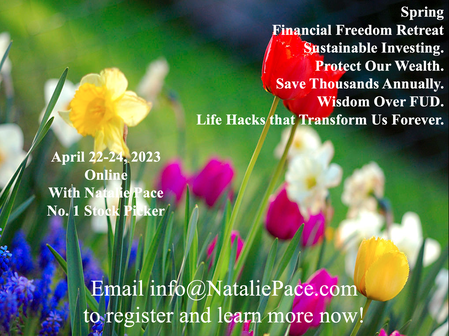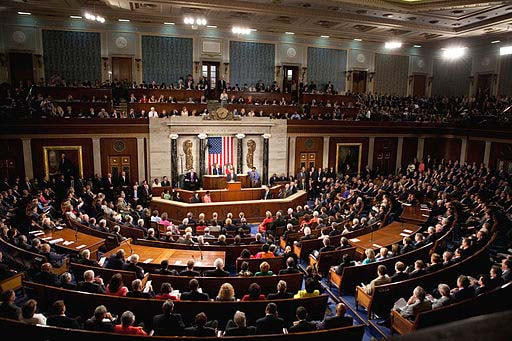|
The Debt Ceiling: Will the U.S. Stop Paying Bills in June? The Debt Ceiling. Investors Ask Natalie. Recently, I was asked a question about the Debt Ceiling on my Instagram page. “Wouldn’t limiting government spending be the fire to put pressure on the politicians, instead of raising the Debt Ceiling?” Signed, Fed Up With Debt and Deficits Here’s my response: Dear Fed Up with Debt and Deficits: All of it needs to happen. It’s an “and” not an “or” situation. Think of it this way. If you were in debt and your budget was in the red, would the right answer be to stop paying all of your bills and have your credit score go into the toilet? If you did that, it would cost you even more to get out of trouble. Everything you owe would now be assessed at a much higher interest rate. Our elected leaders need to balance the budget, reduce debt, and they need to pay bills on time, just as we all do in our households. Of course, there are still a lot of questions surrounding debt and the Debt Ceiling, including: What is the Debt Ceiling and Why Does it Matter? When Were the Last Debt Ceiling Crises? How Did We Get Here? Debt in the U.S. vs. The Rest of the World Sovereign Credit Ratings Countries to Consider Diversifying Into And here is the 411 on those questions. What is the Debt Ceiling and Why Does it Matter? Congress has control of the purse strings, controlling how much the U.S. Treasury spends. When there is a budget deficit, the U.S. Treasury raises money by selling Treasury Bills and other bond instruments that we promise to pay back with interest to the investors who buy them. When the Debt Ceiling is hit, then Congress has to give the okay for the U.S. Treasury to sell more T-Bills and bonds to raise money to pay the bills. On January 19, 2023, the U.S. hit the Debt Ceiling. Since then U.S. Treasury Secretary Treasury Janet Yellen has been using “extraordinary means” to pay the bills, instead of issuing more debt. Former U.S. Treasury Secretary Steven Mnuchin said that process is like treating the U.S. economy like a “piggy bank.” That kind of parsing is expected to work until early June, according to Janet Yellen. The Congressional Budget Office warns of a default sometime between July and September. A default could lower the AAA credit rating that the U.S. has with Fitch Ratings and Moody’s. (S&P Global downgraded the U.S. to AA+ on August 5, 2011, as a result of that Debt Ceiling crisis.) However, a default could also cause a crisis in some U.S. corporates. According to Fitch Ratings, in a press release on Feb. 13, 2023, “Areas of immediate concern would likely include speculative-grade issuers with weaker balance sheets and financial flexibility, companies operating in sectors where demand is more interest rate sensitive (e.g. housing and autos) and those with near term maturity risk and/or short-term, floating rate borrowings.” That kind of calamity would deepen the expected 2023 U.S. recession, which to date economists have been projecting to be “mild.” Recessions are very difficult on Main Street and Wall Street. Both are already being squeezed by inflation. So, you can see that a default on our obligations, due to Congress not raising the Debt Ceiling in a timely manner, would have a ripple effect that could become a cataclysmic economic tsunami. When Were the Last Debt Ceiling Crises? On August 2, 2019, then President Donald Trump made a deal with Congress to suspend the debt ceiling until after the 2020 Presidential election – through July 31, 2021. That decision offered a virtual blank check to the Federal Reserve and U.S. Treasury when the pandemic hit. The market was flooded with money to prevent the worst financial crisis since the Great Depression. (This was a phrase touted lock, stock and barrel around the world.) Other countries did pretty much the same. Almost everyone in the U.S. got a check. Zombie businesses were saved from ruin. The downside to flooding the market with too much cash is inflation. And that is what we’re battling today around the world. On December 16, 2021, lawmakers in Congress voted to raise the Debt Ceiling by $2.5 trillion – to $31.4 trillion. We hit that limit on Jan. 19th and are currently at an impasse. How Did We Get Here? So how did we get into this mess in the first place? Which presidents are responsible for the $31.46 trillion in public debt that the United States has amassed? And how does that compare to debt in the rest of the world? Treasury.gov keeps a tally of U.S. debt to the penny. In 2000, the last time the U.S. budget was balanced, the U.S. was carrying $5.7 trillion in public debt, with a Debt to GDP ratio of 55.3%. The economy was bringing in about $10.3 trillion annually then. GDP today is $26.1 trillion, with $31.4 trillion in debt, for a GDP of 120%. Under the two terms of President George W. Bush, the debt more than doubled, going from $5.7 trillion to $11.9 trillion in 2009. Under the two terms of President Barack Obama, the debt increased by 80%, to $20.2 trillion. In four years, President Donald Trump increased the debt by almost $8.2 trillion (to $28.4 trillion). Before the pandemic, in both 2018 and 2019, the debt increased by $1.25 trillion – a higher annual average than the $1.04 trillion average under Obama. Since then, under President Joe Biden, the debt has increased another $3 trillion. As you can see, debt is a problem under all of the Administrations. They have different reasons for increasing the debt, but neither have found the solutions that are needed. Debt in the U.S. vs. The Rest of the World Most of the developed world is carrying a great deal of debt. This is not limited to just the United States. There are many countries that have a lower Debt to GDP, and some that have more (like Japan, Venezuela, Greece and Italy). However, smaller economies have more limited access to investors than the U.S. does. So, their lower debt to GDP doesn’t take away the risk of investing. Click to access the IMF’s Global General Government Debt to GDP Map. Sovereign Credit Ratings S&P, Fitch and Moody’s give AAA ratings to Australia, Denmark, Germany, Luxembourg, the Netherlands, Switzerland, Norway, Sweden and Singapore. The United States has an AAA rating with Fitch and Moody’s, and an AA+ with S&P. Canada has an AAA rating with S&P and Moody’s and an AA+ with Fitch. The European Union has an AAA with Fitch and Moody’s, and an AA with S&P. Countries to Consider Diversifying Into All investments are at risk, more so in a recession. In fact, the traditional safe assets are as concerning in today’s world as stocks. Long-term government bonds lost -26% in 2022 – the worst performer of the year. Exposure to long-term bonds that were losing value, combined with an intense run on the bank, resulted in the failure of Silicon Valley Bank. So, trying to throw everything into cash carries risk as well. What’s a better strategy? Having enough safe, knowing what is safe in a World of Debt, diversifying and regular rebalancing. This might sound complicated, but it is actually much easier than the worry, doubt, losses, stress and risk that accompany doing nothing, being complacent or having blind faith that a broker/salesman is protecting our future for us. Financial literacy is the life math that we all should have received in high school. The sooner we get a solid plan in place, the sooner we can save thousands annually in our budget with smarter choices, live a richer life and sleep soundly knowing our future is protected. Click to read a blog on some of the countries that we are diversifying into in our Sample Pie Charts. We are overweighting an additional 20% safe in our sample pie charts. (We should always keep a percentage equal to our age safe; as we age we have less time to make up losses.) We will cover this and more in our April 22-24, 2023 Financial Empowerment Retreat. (Join us online from anywhere in the world!) You can read about these easy-as-a-pie-chart strategies in our bestselling books. You can learn and implement them at our online Financial Freedom Retreat. You can email [email protected], if you’d like pricing and information on a personalized action plan and an unbiased 2nd opinion on your current strategy. You can also immerse yourself in our Brain Trust Adventures, where we learn how to stop making everyone else rich, live a richer life, protect our assets and form stronger bonds with our community to uplift our family – the elders and future generations. Bottom line The credit rating agencies are all counting on a last-minute deal with Congress to raise the Debt Ceiling. This needs to happen in June to assure everyone that all is well. If things wait until July, we risk a default, which could put companies into peril, deepen the recession and make borrowing a lot more expensive for the United States, and potentially countries around the world. The world economy is very interconnected. When the U.S. sneezes, the world catches a cold. Email [email protected] or call 310-430-2397 if you are interested in learning time-proven investing, budgeting, debt reduction, college prep and home buying solutions that will transform your life and heal our planet at our next Financial Freedom Retreat. We spend one full day on what's safe, helping you to protect your wealth and reduce money stress.  Join us for our Online Financial Freedom Retreat. April 22-24, 2023. Email [email protected] to learn more. Register with friends and family to receive the best price. Click for testimonials, pricing, hours & details.  Join us for an immersive sustainability adventure in Poundbury, England, March 20-27, 2023. Email [email protected] to learn more. Register by April 30, 2023 to receive the best price. Click for testimonials, pricing, hours & details.  Photo of Natalie Pace by Marie Commiskey. Powerscourt Ritz Carlton, Ireland. Photo of Natalie Pace by Marie Commiskey. Powerscourt Ritz Carlton, Ireland. Natalie Wynne Pace is an Advocate for Sustainability, Financial Literacy & Women's Empowerment. Natalie is the bestselling author of The Power of 8 Billion: It's Up to Us and is the co-creator of the Earth Gratitude Project. She has been ranked as a No. 1 stock picker, above over 835 A-list pundits, by an independent tracking agency (TipsTraders). Her book The ABCs of Money remained at or near the #1 Investing Basics e-book on Amazon for over 3 years (in its vertical), with over 120,000 downloads and a mean 5-star ranking. The 5th edition of The ABCs of Money was released on September 17, 2021. Natalie Pace's easy as a pie chart nest egg strategies earned gains in the last two recessions and have outperformed the bull markets in between. That is why her Investor Educational Retreats, books and private coaching are enthusiastically recommended by Nobel Prize winning economist Gary S. Becker, TD AMERITRADE chairman Joe Moglia, Kay Koplovitz and many Main Street investors who have transformed their lives using her Thrive Budget and investing strategies. Click to view a video testimonial from Nilo Bolden. Check out Natalie Pace's Apple Podcast. Watch videoconferences and webinars on Youtube. Other Blogs of Interest Fossil Fuels Touch Every Part of Our Lives Are There Any Safe, Green Banks? 8 Fires the Federal Reserve Board Needs to Put Out. 7 Ways to Stash Your Cash Now The 2 Best Solar Stocks Which Countries Offer the Highest Yield for the Lowest Risk? Rebalance By the End of March Solar, EVs, Housing, HSAs -- the Highest-Yield in 2023? Are You Anxious or Depressed over Money? Why We Are Underweighting Banks and the Financial Industry. You Stream all the Channels. Should You Invest, Too? NASDAQ is Still Down -26%. Are Meta & Snap a Buy? 2023 Bond Strategy Emotions are Not Your Friend in Investing Investor IQ Test Investor IQ Test Answers Bonds Lost -26%, Silver Held Strong. 2023 Crystal Ball for Stocks, Bonds, Real Estate, Cannabis, Gold, Silver. Tilray: The Constellation Brands of Cannabis New Year, New Healthier You Tesla's $644 Billion Fall From Mars Silver's Quiet Rally. Free Holiday Gift. Stocking Stuffers Under $10. Cash Burn & Inflation Toasted the Plant-Based Protein Companies Save Thousands Annually With Smarter Energy Choices Is Your FDIC-Insured Cash Really Safe? Giving Tuesday Tips to Make Your Charitable Contribution a Triple Win. Is Your Pension Plan Stealing From You? The FTX Crypto Fall of a Billionaire (SBF). Crypto, Gold, Silver: Not So Safe Havens. Will Ted Lasso Save Christmas? 3Q will be Released This Thursday. Apple and the R Word. Yield is Back. But It's Tricky. The Real Reason Why OPEC Cut Oil Production. The Inflation Buster Budgeting and Investing Plan. No. Elon Musk Doesn't Live in a Boxabl. IRAs Offer More Freedom and Protection Than 401ks. Will There Be a Santa Rally 2022? What's Safe in a Debt World? Not Bonds. Will Your Favorite Chinese Company be Delisted? 75% of New Homeowners Have Buyer's Remorse Clean Energy Gets a Green Light from Congress. Fix Money Issues. Improve Your Relationships. 24% of House Sales Cancelled in the 2nd Quarter. 3 Things to Do Before July 28th. Recession Risks Rise + a Fairly Safe High-Yield Bond DAQO Doubles. Solar Shines. Which Company is Next in Line? Tesla Sales Disappoint. Asian EV Competition Heats Up. 10 Wealth Strategies of the Rich Copper Prices Plunge Colombia and Indonesia: Should You Invest? 10 Misleading Broker/Salesman Pitches. Why are Banks and Dividend Stocks Losing Money? ESG Investing: Missing the E. Bitcoin Crashes. Crypto, Gold and Stocks All Crash. The U.S. House Decriminalizes Cannabis Again. The Risk of Recession in 6 Charts. High Gas Prices How Will Russian Boycotts Effect U.S. Multinational Companies? Oil and Gas Trends During Wartime Russia Invades Ukraine. How Have Stocks Responded in Past Wars? 2022 Crystal Ball in Stocks, Real Estate, Crypto, Cannabis, Gold, Silver & More. Interview with the Chief Investment Strategist of Charles Schwab & Co., Inc. Stocks Enter a Correction What's Safe in a Debt World? Money Market Funds, FDIC, SIPC: Are Any of Them Safe? My 24-Year-Old is Itching to Buy a Condo. Should I Help Him? The 12-Step Guide to Successful Investing. Gardeners Creating Sanctuary & Solutions in Food Deserts. The Bank Bail-in Plan on Your Dime. Rebalancing Your Nest Egg IQ Test. Answers to the Rebalancing Your Nest Egg IQ Test. Important Disclaimers Please note: Natalie Pace does not act or operate like a broker. She reports on financial news, and is one of the most trusted sources of financial literacy, education and forensic analysis in the world. Natalie Pace educates and informs individual investors to give investors a competitive edge in their personal decision-making. Any publicly traded companies or funds mentioned by Natalie Pace are not intended to be buy or sell recommendations. ALWAYS do your research and consult an experienced, reputable financial professional before buying or selling any security, and consider your long-term goals and strategies. Investors should NOT be all in on any asset class or individual stocks. Your retirement plan should reflect a diversified strategy, which has been designed with the assistance of a financial professional who is familiar with your goals, risk tolerance, tax needs and more. The "trading" portion of your portfolio should be a very small part of your investment strategy, and the amount of money you invest into individual companies should never be greater than your experience, wisdom, knowledge and patience. Information has been obtained from sources believed to be reliable. However, NataliePace.com does not warrant its completeness or accuracy. Opinions constitute our judgment as of the date of this publication and are subject to change without notice. This material is not intended as an offer or solicitation for the purchase or sale of any financial instrument. Securities, financial instruments or strategies mentioned herein may not be suitable for all investors. Comments are closed.
|
AuthorNatalie Pace is the co-creator of the Earth Gratitude Project and the author of The Power of 8 Billion: It's Up to Us, The ABCs of Money, The ABCs of Money for College, The Gratitude Game and Put Your Money Where Your Heart Is. She is a repeat guest & speaker on national news shows and stages. She has been ranked the No. 1 stock picker, above over 830 A-list pundits, by an independent tracking agency, and has been saving homes and nest eggs since 1999. Archives
July 2024
Categories |







 RSS Feed
RSS Feed